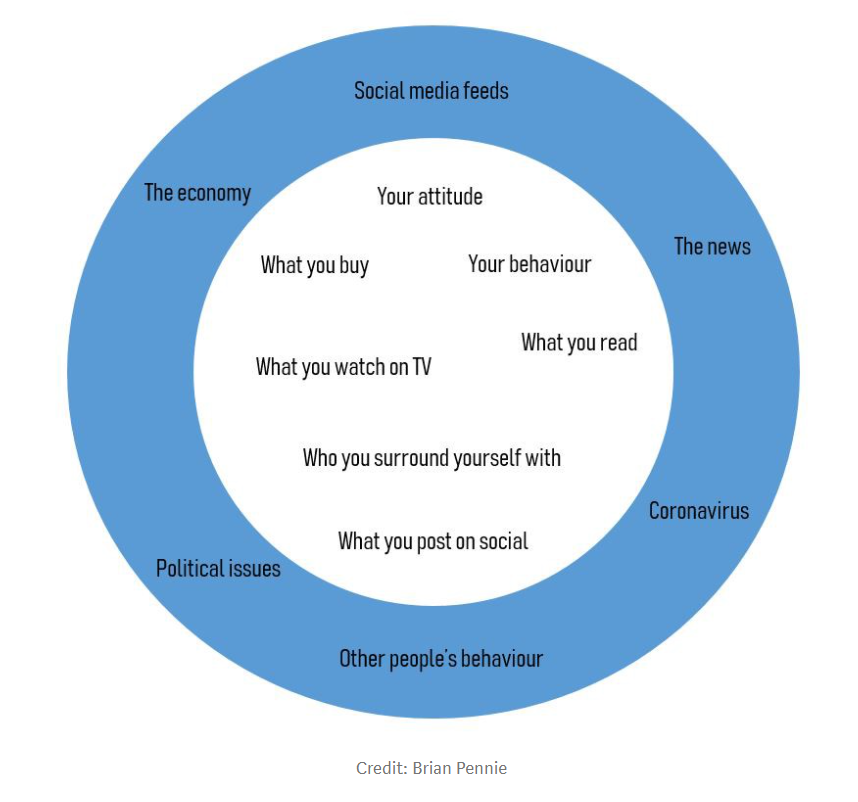Carry Your Own Weather
“Between stimulus and response there is a space. In that space lies our freedom and power to choose our response. In those choices lie our growth and our happiness.”
Imagine you have an important appointment to go to. You are dressed to the nines and you feel great! Suddenly, the overcast sky opens up and it starts to rain heavily. What do you do? Do you curse and bemoan your luck? You feel frustrated and anxious as you know it is very difficult to call for a taxi during bad weather and you don’t want to be late for your appointment. You start to feel pity for yourself, recalling the many times that things don’t go your way. You feel the universe is out to get you.
Or is this you? You take a deep breath and look at your watch. You tell yourself that you still have time and you can catch a bus to your appointment. You change into an old pair of comfy shoes, keep your nice ones in a shoe bag and head out with your favourite tunes playing in your earphones. You appreciate the coolness of the rainy day and are thankful that the bus arrived within 5 minutes of you waiting at the bus stop. There is an empty seat in the bus - what luck! You arrived at your destination with 15 minutes to spare.
Which of the two scenarios do you relate to the most? I admit that for most of us, it’s the first situation. We tend to react negatively to external circumstances beyond our control. We spiral downwards in our negativity, often making the situation worse than it actually is. It takes a lot of mental discipline and strong self-awareness to be able to stop yourself from reacting and consciously making choices as to how you want to react.
Dr. Stephen R. Covey wrote about the habit of being proactive in his book, The 7 Habits of Highly Effective People. To be proactive means taking responsibility for your life. Reactive people are often affected by their external circumstances and physical environment. They find external sources to blame for their behaviour. If the weather is good, they feel good. If it isn't, it affects their attitude and performance, and they blame the weather.
Proactive people, on the other hand, recognize that they are "response-able." They don't blame genetics, circumstances, conditions, or conditioning for their behaviour. They know that they can choose their behaviour. They “carry their own weather”. Taking this outlook liberates you from being trapped in your circumstances.
"It is our choices ... that show what we truly are far more than our abilities."
-Albus Dumbledore (J.K. Rowling)
What can we do to start shifting from being reactive to proactive? We start by the words we use.
Reactive people believe they are not responsible for what they say and do--they think that they do not have a choice. Therefore, they use words like “I can’t”, “I have to” and “If only…”. A proactive person uses proactive language such as “I can”, “I will” and “I prefer”.
Instead of worrying about conditions over which they have little or no control, proactive people focus their time and energy on things they can control. The problems, challenges, and opportunities we face fall into two areas--Circle of Concern and Circle of Influence.
Everything that you are concerned about in your life, whether it is within your control or not lies in your Circle of Concern. Your Circle of Influence comprises of the things that you are concerned about that you can actually do something about. This is the circle that proactive people spend their time in.
When you think of the Covid-19 pandemic, what aspects of it are within your Circle of Concern and Circle of Influence. The following diagram, designed by Brian Pennie, provides a good illustration of these two Circles. The outer circle in blue is your Circle of Concern. You can’t expedite the making of the vaccine for the virus but you can take proper hygiene care of yourself. You can’t control how everyone else is reacting but you can choose the programs you watch and the articles that you read.
Similarly, in the example at the start of this post, the rain and the unavailability of taxis fall within your Circle of Concern but your decision either to lament your faith or proactively choose an alternative mode of transport is clearly within your Circle of Influence.
The key thing to remember is that you always have a choice. Once you make up your mind that you don’t have a choice, your power as an individual will be diminished. Take your power back by starting to see that in every situation, you have a choice and start making those choices.
If you are looking for support to move from being reactive to become more proactive in your life, please reach out to me here for a free 30 minutes discovery call on how I can help you as your coach.
I’m running a Group Coaching session to help you Create Your Unique Resilience Plan on 27 November 2020, 8:30 p.m. Singapore Time (8:30 a.m. Eastern Standard Time). You will explore your inner resources which have helped you cope with past challenges and leverage and build upon these resources to face future challenges. If you feel that this is something that can help you right now, please click here to reserve your place.



